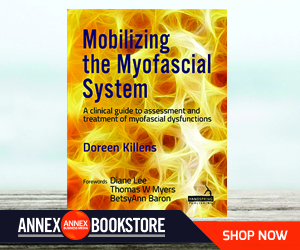| |
| |
 |
 |
| |
 |
|
@{mv_date_MMM d, yyyy}@ |
|
| |
» Read more...
» Read more...
» Read more...
|
| |
|
| |

Fascia has become the new buzzword in the field of rehabilitation and movement re-education. Until recently its contribution to musculoskeletal dysfunction had been underestimated. We know now that fascia plays an important role in health, wellbeing and mobility. It transmits the power of the muscles, communicates with the nervous system and serves as a sense organ. Many different groups of professionals are now exploring the world of fascia, as evidenced by the explosion of research in this field. However, many physical therapists are still unfamiliar with fascia and continue to think of it as the ‘dead packing material’ that is pushed aside during dissections in order to visualize the ‘important stuff’ like muscles and nerves. Physical therapists with their varied skill-set in manual therapy techniques are well-placed to take on this important tissue. Mobilization of the Myofascial System aims to help them to do that.
>> Order Now |
| |
|
| |
 About 1 in 9 mothers suffers from maternal depression, which can affect the mother-infant bond as well as infant development. Touch plays an important role in an infant’s socio-emotional development. Mothers who are depressed are less likely to provide their babies with soothing touch, less able to detect changes in facial expressions, and more likely to have trouble regulating their own emotions. In addition, infants of depressed mothers exhibit similar brain functioning patterns as their depressed mothers, which also are linked to temperament characteristics. Infants of depressed mothers are at a high risk of atypical and potentially dysregulated social interaction.
» Learn More
About 1 in 9 mothers suffers from maternal depression, which can affect the mother-infant bond as well as infant development. Touch plays an important role in an infant’s socio-emotional development. Mothers who are depressed are less likely to provide their babies with soothing touch, less able to detect changes in facial expressions, and more likely to have trouble regulating their own emotions. In addition, infants of depressed mothers exhibit similar brain functioning patterns as their depressed mothers, which also are linked to temperament characteristics. Infants of depressed mothers are at a high risk of atypical and potentially dysregulated social interaction.
» Learn More |
| |
|
| |
|
|
| |
| |




